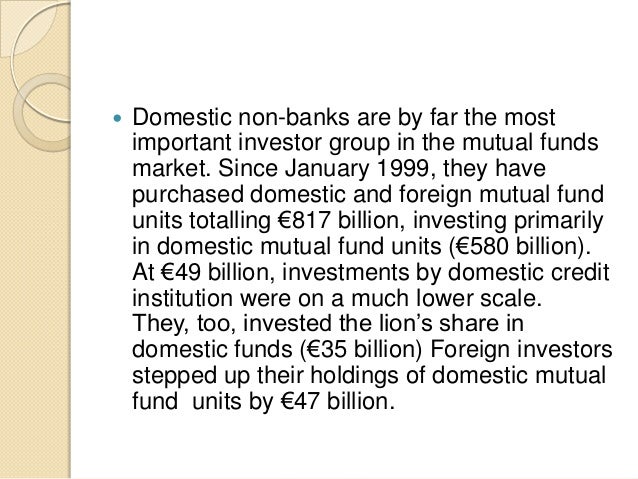Mutual Funds In Germany
- Mutual Funds That Invest In Germany
- Best European Mutual Funds 2018
- Best Mutual Funds To Invest In Germany
Trusted, unbiased mutual fund ratings, analysis, and data. Start a 14-day free trial to Morningstar Premium for our analysts' best mutual fund picks.
Germans are different, and it often matters. Take, for example, a subject of more than passing interest: money. At a rudimentary level, Germans have the same attitude toward money as English-speaking people and others do: They like it, and they’d like more of it.
But beyond that, Germans think about money in a way that is, to put it charitably, idiosyncratic.For starters, compare attitudes about borrowing. Anglo-Saxons see no problem with that. They borrow money, then spend it on college tuition, get a better job and eventually make even more money. Or they just have fun. At some point, the bank might call.
But, you know, who cares? Germans are aghast at such flippancy. Phonetically, etymologically, and psychologically, they understand that Schulden (debt) = Schuld (guilt).
Borrow, and thou shalt die. Thy death will be slow and painful.The differences are just as stark on the savings side. Anglo-Saxons, if they have money left over, will put it where they have been told it will grow. So they buy shares, either directly or through mutual funds.
The stock market sometimes nosedives, as in 2008. But they are sure that in the long run they will win. They also buy houses, because they can live in them, and they don’t like paying rent. To buy the houses, they borrow (see previous paragraph).
Some are unlucky and get foreclosed on. But most pay off their mortgages, then retire with their house and their shares and feel wealthy.Don’t those Brits and Americans understand that shares are risky, and that risk is, well, dangerous?Germans look askance at shares, and many never buy their own houses (probably because that would mean borrowing). Don’t those Brits and Americans understand that shares are risky, and that risk is, well, dangerous? Germans instead practice safe saving. They put their money into savings accounts at local. The interest paid is not visible even with a magnifying glass, and the money often shrinks when counted after taxes and inflation.
Germans also buy life-insurance policies of a type that Anglo-Saxons don’t really have. These are so-called “capital-life” policies. Like term-life policies, they pay money to loved ones if the policyholder dies.
But these German policies are really savings accounts or pension plans, in that they accumulate capital until retirement and then pay an annuity even when the policyholder doesn’t die.Some of that return is guaranteed by the insurer. But some is discretionary and thus at risk. These subtleties are in the fine print, which even Germans don’t read. Almost all Germans have placed their trust in such insurance: There are actually more capital-life policies than people living in the country.Jeremy Gray, one of our finance editors, For many years, the life insurers promised policyholders high returns, and Germans based their retirement expectations on those promises. Then interest rates fell almost to zero, and the insurers could not invest the premiums to honor their promises and still make a profit.
Mutual Funds That Invest In Germany
So now the insurers are in trouble, because their old policies have become time bombs. Many are unloading them to bargain hunters, rather as troubled lenders set up “bad banks”. Some German life insurers are no longer financially sound.
Best European Mutual Funds 2018
A new financial crisis is conceivable.And the policyholders? Many are suddenly realizing that their policy won’t pay out anything near the amount they had factored into their retirement planning. Some panic, and surrender their old policies, which is often a bad idea. Many fear poverty in their old age.Just knowing a bit about these different money cultures helps to understand a lot of European politics today. Many Germans consider it self-evident that low interest rates, and by implication the European Central Bank, are the root of all evil. Anglo-Saxons, meanwhile, are watching their stock portfolios and house prices go up, and are looking for a central banker to hug.Until the next market crash.
Best Mutual Funds To Invest In Germany
Last time, it came from America and, tellingly, had to do with houses and shares, among other things. Next time, could it start in Germany and those staid insurance firms?To contact the author.
DisclaimerYou are now leavingThe page you selected has opened in a new window. If you do not want to proceed, simply close this new window.We have provided this link only as a convenience. Providing this link is not, and does not imply an affiliation, sponsorship, endorsement, approval, investigation, verification or monitoring by DWS of any information contained in the Website. In no event shall we be responsible for the information contained on the site or you use of,or inability to use, the site.

You should be aware that the terms and conditions of the site and the site's privacy policy may be different from those applications of your use of dws.com. I have read the disclaimerPlease indicate that you have read the disclaimer.